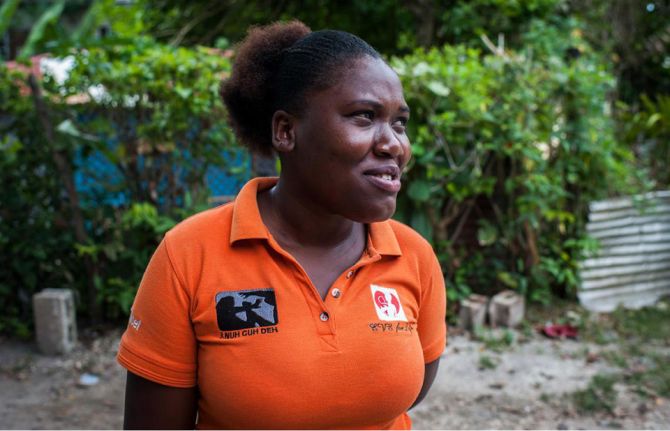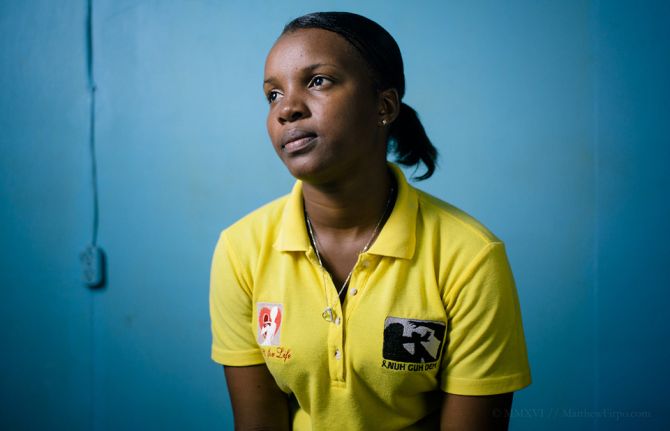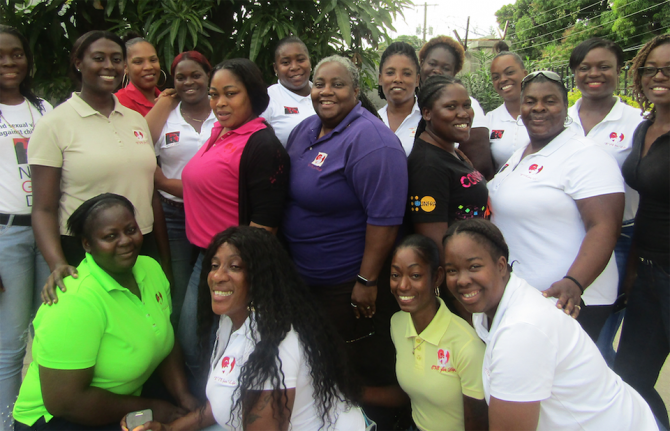



Feature Story
Confronting the link between HIV and gender-based violence in Jamaica
07 November 2019
07 November 2019 07 November 2019Monique McDonald is an HIV peer educator who tells the story of her childhood with unflinching courage. “I was sexually abused by my uncle at the age of 12 and contracted HIV.”
Ms McDonald has written about her experiences in a book called I am now free. It uses her old diary entries to describe the abuse she suffered as a child and her journey to recovery. Today, she supports young women living with HIV, helping them to come to terms with their status and advising them on adhering to treatment. She has also founded the Ashley Fund to help other sexual abuse survivors to continue their education.
She admits that it’s been a long road.
“I was so depressed, I didn’t know who to trust,” she remembers. “How could this happen, and everybody turned their eyes?”
Rushell Gray reflects on her past with a similar mix of sorrow and disbelief.
“As a young girl everybody turned a blind eye and blamed me. I was the AIDS girl walking around in the community. Nobody said, “this man needs to go to jail.” At one point I almost gave up because the stress was too high,” she said.
Ms Gray now works as a Mentor Mom. The Mentor Mom programme enlists young mothers living with HIV to share their experiences and help other young women coping with similar situations. Mentor Moms answer questions and offer reassurance, accompany young women and girls on their health visits and reinforce clinical guidance on the importance of taking medicines regularly.
Both Ms McDonald and Ms Gray are employees and past clients of Eve for Life, a Jamaican nongovernmental organization that helps to prevent new HIV infections and improve the quality of life of women and children living with or affected by HIV. Clients benefit from peer support groups, psychological care and empowerment programmes.
Joy Crawford and Patricia Watson founded Eve for Life 11 years ago. While supporting young women and girls affected by HIV, they quickly learned that there was a clear link between HIV infection, adolescent pregnancy and child sexual abuse. According to Situation analysis of Jamaican children, a 2018 report by the United Nations Children’s Fund (UNICEF), more than one in five (21%) adolescent girls in Jamaica said that they had survived sexual violence.
As a long-standing provider of technical support and capacity-building around sustainability for Eve for Life, UNICEF is keen not only on supporting girls, but addressing the cultural norms that make them vulnerable.
“There is this pervasive idea that adult men should have some level of access to a girl’s body if they are in their life, supporting the family or something like that,” explains Novia Condell, UNICEF Jamaica’s Adolescent Health and Empowerment Specialist. “Of course, the girl has no power to negotiate any protection in a situation where she has been abused or exploited.”
High on UNICEF’s agenda is supporting the community engagement necessary to shift attitudes around child sexual abuse. Eve for Life has spearheaded the “Nuh guh deh” (don’t go there) campaign, which aims to stop sexual abuse. They use complementary strategies—everything from community meetings to music videos—to get the message out.
The UNAIDS country office in Jamaica also provides technical support to Eve for Life and has helped the organization build partnerships for resource mobilization. The UNAIDS Caribbean subregional office is also working with Eve for Life to create safe spaces for young survivors and leaders to raise awareness about the link between gender-based violence and HIV.
There is also a focus on meeting young women’s basic needs, including food, clothes and health care. But beyond these services, work continues to provide teenage girls and young women living with HIV with a deeper level of emotional support and mentorship.
“Jamaica’s Ministry of Health has found a strong partner in Eve for Life—one that is able to focus on resilience and life skills-building. They get the girls’ lives on track so they can improve their lot and the lot of their children,” says Ms Condell.



